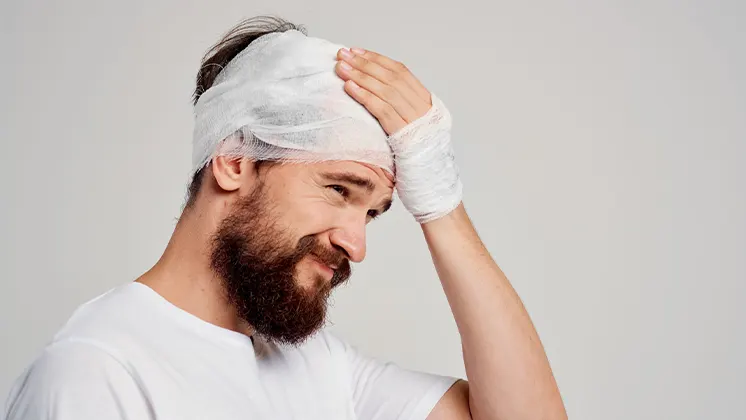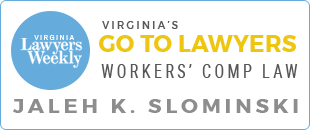Workplace Concussion Claims and Virginia Workers Compensation

Suffering a concussion at work can be a scary and confusing experience. You may be wondering what steps to take to file a workers’ compensation claim, what benefits you might be entitled to, and what the process will look like. This general guide covers what you need to know about pursuing concussion-related workers’ compensation in Virginia. For case-specific legal advice, get a free consultation with us at Slominski Law.
What is a Concussion?
A concussion is a traumatic brain injury caused by a bump or blow to the head. During this sudden movement, the brain may bounce in the skull, or get twisted or stretched, damaging brain cells, creating chemical changes, or altering brain function.
While concussions are usually not life-threatening, their effects can be serious. Most concussions get better with rest and time, but symptoms can last for days, weeks, or even months in some cases. Common concussion symptoms include:
- Headache or neck pain
- Nausea
- Vomiting
- Dizziness
- Blurred vision
- Sensitivity to light or noise
- Ringing in the ears
- Difficulty concentrating or remembering
- Feeling sluggish, foggy, or groggy.
Concussions that happen at work most often occur because of falls or accidents involving vehicles, heavy equipment, tools, or being struck by an object. Jobs with a high risk of concussions include construction workers, firefighters, manufacturing workers, police officers, athletes, and military personnel.
Workers’ Compensation Overview
Workers’ compensation is a form of insurance that provides medical, disability, and other benefits to employees who get job-related illnesses and injuries. These include concussions. In the workers’ comp system, employers must carry this insurance to cover the cost of benefits so that injured employees do not have to pay medical bills or cover lost wages out of pocket.
Workers’ compensation laws are administered at the state level. In Virginia, most employers are required to have workers’ compensation insurance. The Virginia Workers’ Compensation Commission oversees claims, disputes, hearings, and appeals relating to workers’ compensation claims in the state.
Do I Have a Case for Workers’ Compensation After a Workplace Concussion?
In general, if you suffered a concussion due to an accident, injury, or activity that occurred as part of your job, you may have a Virginia workers’ compensation claim. Note these key factors that strengthen a concussion claim:
- Your concussion diagnosis is confirmed by objective medical testing. Subjective symptoms alone may not be enough.
- You reported the accident and injury to your employer shortly after it happened.
- The concussion occurred from a single incident, not general repetitive trauma over time.
- Witnesses can corroborate what happened to cause the concussion.
In Virginia, you have two years from the date of injury to file a workers’ compensation claim. It’s important not to delay reporting your injury and seeking medical confirmation of your condition.
Proving Your Concussion is Work-Related
The burden of proof will be on you as the injured employee to show that your concussion arose out of and in the course and scope of employment. You’ll need to demonstrate that you suffered the concussion while performing typical job duties or an activity reasonably related to your work.
For example, the injury may qualify as work-related if you hit your head after slipping off a ladder while stocking a high shelf. Or you may have been injured by the actions of a third party while carrying out normal work activities – maybe a vendor accidentally hit you with equipment while making a delivery at your job site.
If your concussion occurred due to willful misconduct on your part, like getting into a fight with a coworker, you may lose your right to workers’ compensation benefits.
Medical Evidence Needed for a Virginia Work Comp Concussion Claim
The lynchpin of any successful concussion-related workers’ compensation claim is solid medical evidence. Under Virginia law, the treating physician must provide a written medical report supporting the claim. This report should confirm the concussion diagnosis and provide details on symptoms, treatments, work restrictions, and expected recovery time frame.
Objective evidence of injury like CT scans or MRIs can help demonstrate the concussion’s severity and impact. It’s also helpful to have documentation of the accident, such as a written incident report to your employer describing how your head was hit.
Be prepared to face insurance adjusters who may ask you to sign blanket medical releases so they can access your medical history. Note that you are NOT required to sign such releases. Workers’ comp insurance companies may have the right to see medical records related to your current injury, but they are not entitled to access your entire medical history. Consult a lawyer before signing any authorization.
Concussion Workers’ Comp Benefits in Virginia
If your claim is accepted, you may recover several types of wage replacement and medical benefits under Virginia’s workers’ compensation system:
Medical Benefits
This covers reasonable and necessary medical expenses to treat your concussion and any related conditions. This includes hospital fees, medications, exams, physical therapy, rehabilitation, assistive devices like wheelchairs, and mileage reimbursement for appointments.
Temporary Total Disability
If your doctor takes you fully off work for some time to recover from your concussion, you may receive temporary total disability wage replacement benefits starting on the 8th day of lost time. The benefit equals two-thirds of your average weekly wage up to a maximum. (The maximum changes every year.)
Temporary Partial Disability
If you can only work reduced hours or light duty, you may get temporary partial disability benefits. This makes up two-thirds of the difference between your pre-injury earnings and what you currently make.
Permanent Partial Disability
If your concussion causes lasting impairment, decreased earning capacity, or the need for long-term medical care, you may receive permanent disability benefits based on your level of impairment.
Death Benefits
If a loved one died due to a traumatic brain injury suffered at work, their surviving dependents may claim death benefits including funeral costs and wage loss.
Tips for Reporting Your Workplace Concussion
Taking prompt action is crucial when you suffer a concussion at work in Virginia. Here’s what to do:
Report It Immediately
Notify your supervisor right away that you suffered a head injury so that it can be formally documented. Don’t delay reporting even if symptoms are mild at first.
Seek Medical Care
Get checked out by a doctor as soon as possible after the concussion occurs. Be sure to mention it is work-related. Early diagnosis and treatment lead to better outcomes.
Document Details
Write down exactly when and how the accident happened, noting any witnesses. Capture photos of the scene showing potential safety hazards. Keep records of all concussion symptoms and treatment.
Talk to Witnesses
Get written statements from coworkers or others who saw the incident so you have corroboration that the concussion occurred on the job.
Hire an Attorney
An experienced Virginia work injury lawyer can help you navigate the workers’ compensation system while you focus on healing.
Virginia Work Comp Hearings and Appeals
In undisputed concussion cases with prompt medical attention, you may get wage loss and medical benefits without too much hassle from the insurer. However, the insurance company may delay or deny your traumatic brain injury claim even with medical evidence. The insurer may dispute the injury’s work-relatedness, the concussion’s severity, appropriate treatment, or the extent of disability.
If you cannot resolve such disputes informally, your attorney can request a hearing before the Virginia Workers’ Compensation Commission. Both sides present evidence to support their case. The Commission will then issue a ruling determining whether benefits should be paid. If either party disagrees with the outcome, they can file an appeal within 30 days.
Workers’ comp insurers are highly experienced in this process. Having a skilled work injury lawyer in your corner levels the playing field and advocates aggressively for the benefits you deserve.
What Makes Slominski Law The Best Firm For Virginia Work-Related Concussion Workers Compensation Claims?
For over 30 years now, Attorney Jaleh Slominski has been assisting injured workers in Virginia secure fair compensation after workplace accidents and illnesses. This includes traumatic brain injuries like concussions. What sets Ms. Slominski apart is her compassionate approach and personalized attention for each client she represents.
You are more than just a case number at Slominski Law. Ms. Slominski will walk you through every step of the workers’ compensation process from start to finish. Her goal is to reduce stress so you can focus your energy on getting better while she handles the legal complexities.
At Slominski Law, every client gets direct access to Attorney Slominski throughout their case. You won’t be delegated to a paralegal or less experienced attorney. Ms. Slominski also makes home or hospital visits whenever needed so injured workers don’t have to travel to her office.
Contact Slominski Law at (434) 384-9400 (Lynchburg office) or (540) 554-3762 (Roanoke office) for a free consultation about your workplace concussion claim. Attorney Jaleh Slominski provides dedicated legal representation to clients in Lynchburg, Roanoke, and surrounding areas.





